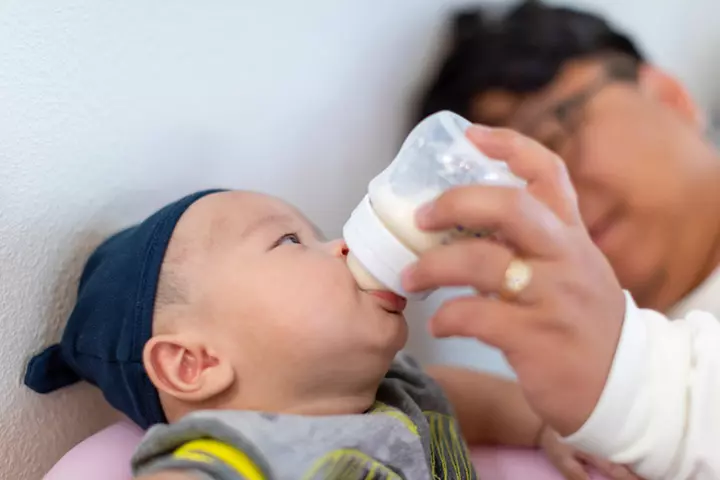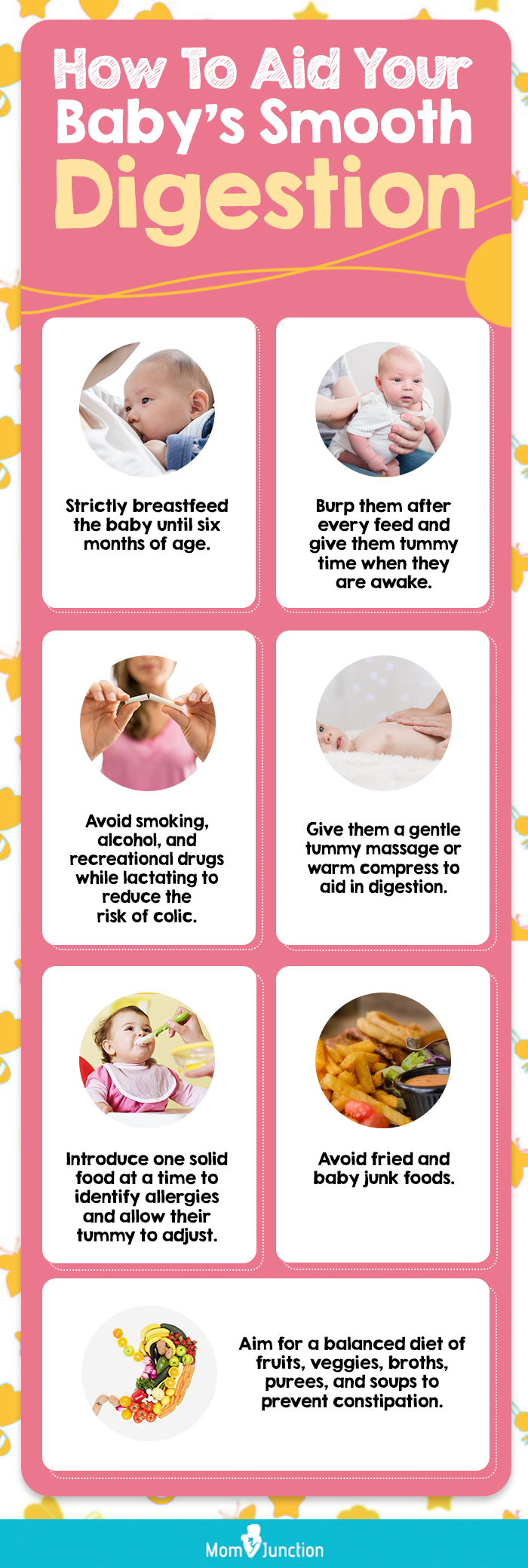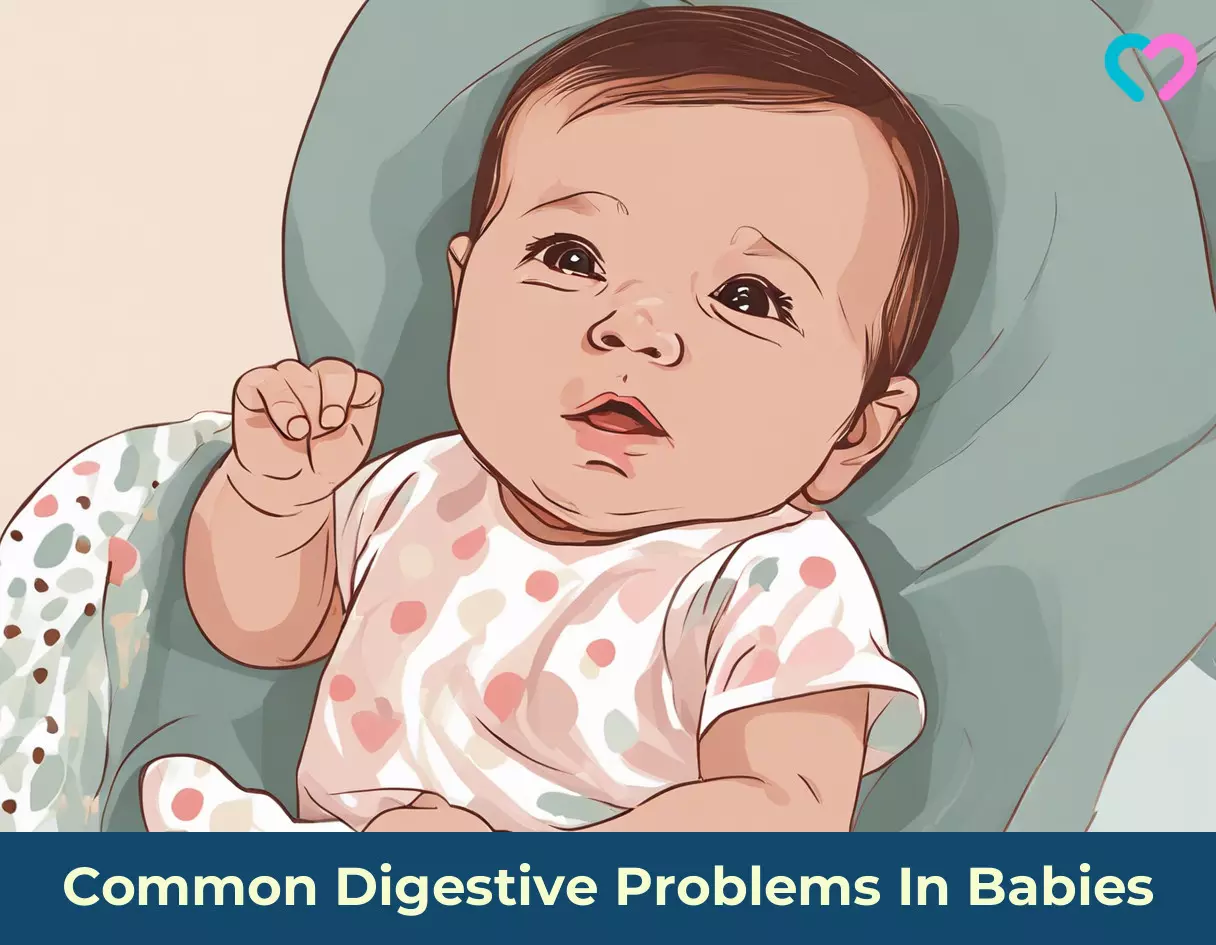
Image: ShutterStock
Digestive problems in babies are common. But these issues are tough to identify since babies may show a number of symptoms ranging from spitting food, lack of appetite, vomiting, diarrhea, or constipation. Most babies look restless and fussy during digestive issues. It is recommended to seek pediatric care for babies behaving unusually or crying since it can be painful. The digestive system gradually matures over time. So exposure to certain factors can cause concerns. Read on to know more about the causes, symptoms, and treatments of digestive problems in infants.
Key Pointers
- Digestive issues are often seen in babies, characterized by their restlessness and fussy behavior.
- Factors such as a milk-based diet and an immature gut may trigger digestive issues in babies.
- Vomiting, diarrhea, colic, constipation, and gas are common digestive symptoms in babies.
- Helping them burp after every feed, giving a tummy massage, and not smoking while breastfeeding may prevent digestive issues in babies.
Common Digestive Problems In Babies
As babies grow, their digestive systems undergo several changes, which can lead to various digestive issues. Awareness of these developmental stages can help you better understand your baby’s digestive health.
1. Reflux
Gastroesophageal reflux (GER) refers to the involuntary passage of gastric contents into the esophagus (food pipe). Infants are more prone to reflux, and it gets better as they grow in age. Various factors, including a milk-based diet and immature gastroesophageal junctioniThe junction where the stomach meets the esophagus (food pipe). , are responsible for higher rates of GER in babies (1).
When to see the doctor?
Reflux usually gets better as the baby grows, but do not hesitate to see your pediatrician if you see the following symptoms (2).
- Vomiting especially if green or reddish in color
- Reduced appetite or refusing feed
- Weight loss or lack of weight gain
- Rattling sound in the baby’s chest and back
- Breathing difficulty during feeding
- Choking spells
What you can do
The following changes can help manage the reflux better (2).
- Hold the baby upright in your arms for 30 minutes after every feed. If comfortable, the baby can be held upright during feeding too.
- Feed smaller amounts and feed often.
- Burp your baby after every feed.
- Don’t tie the baby’s diaper too tight.
2. Vomiting

Image: Shutterstock
Vomiting is defined as the forceful expulsion of gastric contents through the mouth and/or nose (3). Infants spit up small amounts during feeding, after feeding, or while burping. The amount expelled is typically less than 5-10ml. Rapid feeding, overfeeding, and swallowing of air are some of the causes of vomiting in babies. Repeated vomiting or regurgitation might indicate gastrointestinal issues in infants. Contact your baby’s pediatrician to diagnose the cause (4).
When to see the doctor?
Vomiting can cause dehydration in babies (5). You should see a doctor immediately in the following circumstances.
- Vomiting very often
- Vomiting green bile
- Vomiting blood
- Vomiting is followed by severe lethargy or inactivity
- The baby displays signs of severe distress and crankiness after vomiting
- Convulsions accompany or occur after or before vomiting
What you can do
Taking the following precautions might help a baby recover from vomiting. However, it should be done after discussing it with the pediatrician.
- Hold the baby upright after feeding.
- Give enough breast milk or formula to prevent dehydration.
- Keep the baby cool and comfortable so that excess fluids are not lost due to sweating.
3. Diarrhea

Image: Shutterstock
Normal baby stools are loose and pasty. Newborns have frequent stools, often after every feed (6). Diarrhea is the passage of loose or watery stools occurring three or more times in 24 hours (7). Diarrhea can deplete the essential salt and water content in the body (8).
When to see the doctor?
Diarrhea causes dehydration in babies. Seek medical attention if you notice any signs of dehydration such as dry mouth, no tears, no urine, and fever or if the stools have mucus or blood stains (6).
What you can do
Take the following measures when your baby develops diarrhea (6).
- Keep breastfeeding if you are still nursing the baby.
However, ensure that you monitor the quantity of feed as excessive breast milk intake may worsen diarrhea (9).
Julia, a mother of two, shares how her son Ryan experienced a bout of diarrhea due to her hyperlactation and breast milk overconsumption. She says, “Ryan was born as healthy as can be, thank God, but got awful, painful, forceful diarrhea at about two weeks old… So many times I thought, all he has had is my milk, how could my “liquid gold” be causing him so many issues?! What was I doing wrong?!… Doctors started guessing why Ryan had so much diarrhea (10–15 times a day of painful and explosive stools) and came up with a milk protein and/or soy protein allergy.
“After five weeks of reading labels on everything and avoiding dairy and soy protein, Ryan was no better!.. It was not until I found a few articles, late one night or early one morning, searching the internet for answers written by some lactation consultants out of Australia, that we got some of our answers… Ryan was getting way too much foremilk and lactose overload… We switched to my pumped milk at two months old to empty the breast and get more of a “balanced meal.” His diarrhea count immediately went from 10–15 explosive stools a day down to around six diarrhea a day and not quite as explosive… He also seemed in less and less pain every day! (i).”
- Do not give any OTC medicines to your baby for diarrhea treatment.
- Ask your baby’s pediatrician if you can give electrolytes like Pedialyte or Infalyte to the baby. Do not use them without a doctor’s consultation.
- If the baby is on solids, give bland and easy-to-digest foods like bananas, crackers, toast, and cereals. Do not give food that is difficult to digest like fried foods, apple juice, milk, concentrated food juices, and foods high in sugar and fat.
- Frequent stools can cause diaper rash. Change the baby’s diaper frequently, clean the baby’s bottom with water instead of wipes, give some diaper-free time, and apply a good diaper rash cream.
- Wash your hands well after cleaning the baby. Diarrhea causing germs can spread the infection quickly.
 Did you know?
Did you know?4. Constipation
Constipation occurs when babies have hard stools or problems in passing stools (10). Although constipation is common in babies, it could be uncomfortable for them. Babies are not considered to be constipated if they pass soft stools (10).
When to see the doctor?
See the doctor immediately in the following scenarios.
- The infant has not passed stools for more than three days in a row and is vomiting or irritable
- Constipation in an infant younger than the age of two months
- Blood in stools
- The baby is holding bowel movements due to pain while passing stools
What you can do
Constipation can be frequent during infancy. But observing a few precautions can help the baby have a healthy bowel movement (10). Here are a few infant constipation remedies that you can try.
- If the baby is exclusively breastfed, then keep breastfeeding at regular intervals.
- If you have started giving pureed foods or juices, then give the baby extra juice or water in between the feeds to increase the water in the intestines.
- For babies over six months of age, try two to four ounces (59 to 118ml) of juices made from fresh fruits like grapes, pears, apples, cherries, or prunes. Feed the juice in small sips throughout the day.
According to Naibi, a mother, you can also feed your child prune tea to help ease constipation. She shares, “Every once in a while my 20-month-old toddler will get constipated and it breaks my heart to see her feeling sick. So during those times of need, I use this simple tea recipe(that I learned from my mother), and it has always worked. …I also called the pediatrician’s office and got the okay (feel free to run it by your medical provider). ”First, pour a cup of water into the small pot and bring to a boil. Once the water is boiling add 3-4 prunes to the pot and lower heat to medium. Let the prunes boil in the water for 7-8 minutes or once you notice the prunes have lost their color. Turn off the heat and let the tea cool (about 10 minutes). Then, place the strainer over your little one’s favorite “sippy” cup or bottle and pour the tea. At this time if your baby is over 12 months old then you add a teaspoon of all-natural honey (ii).”
- If the baby is on a solid diet, then feed high-fiber foods like peas, apricots, pears, spinach, bean, prune, peach, and plums, twice a day. Keep the infant hydrated as well.
- Do not give any medicines or enemaiInjecting medications or fluids through the anal opening to promote a bowel movement. without speaking to the doctor.
5. Colic

Image: Shutterstock
Infantile colic is a benign problem in which an infant has outbursts of inconsolable crying for more than three hours per day, more than three days per week, for longer than three weeks (11). The American Academy of Pediatrics (AAP), estimates that colic occurs in about one in five babies, typically around two to four weeks. It usually begins at about the same time every day. The symptoms of colic may get worse in the evenings. The exact cause of colic is unknown, but it is commonly associated with digestive system problems. Gastrointestinal pain due to overfeeding, gas, and constipation are some of the few reasons. Babies with colic often stop crying after passing stool or gas (12).
When to see the doctor?
You should see a doctor if you are unable to manage colic or if the crying becomes severe. The doctor will ask for a detailed medical history of the baby and do a thorough physical examination. You should see the doctor immediately if the baby starts crying in a different pitch or tone or if the crying is accompanied by other symptoms such as fever, vomiting, diarrhea, bloody stools, and poor appetite (12).
What you can do
The following steps might help you manage the symptoms of colic (12).
- If the baby is exclusively breastfed, then the mother could avoid eating foods that are often associated with colic in babies. A few examples are caffeine, chocolate, dairy products, and nuts.
- Nursing mothers should avoid taking medicines without doctor’s consultation since medicines may also trigger colic.
- If the baby seems to be colicky after consuming a specific formula, then speak to the doctor and switch to another brand.
- Avoid overfeeding and feeding the baby too fast.
- If the baby is crying inconsolably, then try to comfort the baby through swaddling, rocking, music, and distraction (12).
 Quick tip
Quick tip6. Gas
Gas is produced by bacteria in the intestines and can also be swallowed while eating or drinking (13). Babies swallow more air when they cry, and the excess gas gets trapped in the stomach, thus causing pain. Babies who crawl and cruise (walk slowly) might be able to release the gas easily.
When to see the doctor?
Gas usually resolves on its own. But you may see the doctor if the baby seems uncomfortable and distressed, along with feeding problems. The doctor might suggest some measures to help the baby feel better.
What you can do
The following measures might help the baby pass gas easily.
- Give gentle tummy massage to the baby.
- Let the baby have tummy time when awake.
- Bicycle the baby’s legs while the infant lies on their back.
- If the baby is bottle-fed, see to it that the baby does not suck excess air.
If your baby exhibits persistent symptoms, it is crucial to consult a pediatrician for proper diagnosis and treatment. Early intervention can prevent complications. Also, keep track of your baby’s digestive health and note down the frequency and type of symptoms, feeding patterns, and any changes in behavior.
Tips To Improve The Baby’s Digestion
The following tips might help alleviate the baby’s digestive system issues while also improving the baby’s overall digestion.
- Breastfeed the baby until they are six months old.
- Burp the baby after every feed.

Image: Shutterstock
- Give some tummy time every day when the baby is awake.
- If you are lactating, avoid smoking, alcohol, and recreational drugs, which may increase the chance of causing colic in babies.
- Give a gentle tummy massage to the baby. Lukewarm compresses with a towel or hot water bag might also help digest food and avoid newborn digestive problems.

Image: Shutterstock
- When the baby starts solids, start with only one type of food at a time. Introduce other varieties after a few days once the baby is well-settled to the existing ones. It will help determine any food allergies and give the baby’s tummy enough time to grow accustomed to the new food.
- Give a balanced diet to the baby when he/she starts eating solids. Fruits, vegetable broths, purees, and soups are good food options. A balanced diet can help prevent digestive disorders such as constipation and other signs of baby stomach pain or discomfort.
- Avoid giving junk food and fried food to babies.
Frequently Asked Questions
1. When does a baby’s digestive system mature?
Digestive systems of most babies are matured enough to consume solids by the time they are six months old (14)
2.Which enzyme is responsible for the digestion of milk in infants?
Various enzymes in breast milk help in digestion. The important enzymes are (15):
- Plasmin
- Trypsin
- Elastase
- Cathepsin D
- Pepsin
- Chymotrypsin
- Glutamyl endopeptidase-like enzyme
- Proline endopeptidase
3. Do babies digest food while sleeping?
Yes, the digestive system works even when sleeping (18). However, holding your baby upright for at least 30 mins after feeding aids digestion.
4. Can babies have trouble digesting breast milk?
The guts of babies with lactoseiA sugar found in milk and milk products. intolerance lack the digestive enzyme lactase, which reduces the capacity to digest lactose found in breast milk. Diarrhea can be one of the symptoms of lactose intolerance (19).
5. What dietary changes can help with digestive problems in babies?
Introducing any food gradually is crucial. Start with single-ingredient purees to identify possible allergens and avoid foods that are hard to digest initially. Always consult your pediatrician when making dietary changes.
Baby digestive issues include a lack of appetite, reflux, colic, vomiting, diarrhea, and constipation. Tummy massage, burping, or sleeping on the tummy can help with some digestive issues. If the problem persists, you should seek medical help. Timely management of underlying conditions helps avoid nutrient deficiencies leading to growth and development problems. Exclusively breastfeeding for six months and introducing solids gradually after six months help prevent any digestive issues. Most digestive issues gradually disappear as the digestive system matures.
Infographic: Tips To Improve The Baby’s Digestion
While it’s normal for babies to have digestive ups and downs, there are steps you can take to help improve their digestion and minimize the occurrences of constipation or other digestion issues. This infographic covers tips on feeding your baby and managing their overall digestion to ensure the smooth functioning of their system. Illustration: Momjunction Design Team
Illustration: Common Digestive Problems In Babies

Image: Stable Diffusion/MomJunction Design Team
Seeing your baby in distress can be distressing for the parents as well. Learn the reasons why your infant may experience digestive problems and how to prevent them.
Personal Experience: Source
MomJunction articles include first-hand experiences to provide you with better insights through real-life narratives. Here are the sources of personal accounts referenced in this article.
i. My experience with breastfeeding hyperlactation and oversupply; https://medium.com/@juliarack17/my-experience-with-breastfeeding-hyperlactation-and-oversupply-eee5022a27f9ii. Prune tea to the rescue! relieve baby/toddler constipation; https://naibiriverablog.wordpress.com/
References
1. Anna Rybak et al., Gastro-Esophageal Reflux in Children; U.S.National Library of Medicine
2. Gastrointestinal Problems; Stanford CHildren’s Health
3. Matthew Shields and Jenifer R. Lightdale, Vomiting in Children; Pediatrics in Review, AN OFFICIAL JOURNAL OF THE AMERICAN ACADEMY OF PEDIATRICS
4. Deborah M. Consolini, Nausea and Vomiting in Infants and Children; MSD Manual
5. William J. Cochran, Drinks To Prevent Dehydration In A Vomiting Child; AAP
6. Diarrhea in infants; U.S. National LIbrary of Medicine
7. What is Diarrhoea and How to Prevent it; Rehydrate Organization
8. Diarrhoeal disease; World Health Organization
9. Oversupply of breastmilk; Pregnancy, Birth and Baby
10. Constipation in infants and children; U.S.National Library of Medicine
11. JEREMY D. JOHNSON, KATHERINE COCKER, ELISABETH CHANG, Infantile Colic: Recognition and Treatment; American Family Physician
12. Colic and crying – self-care; U.S.National Library of Medicine
13. Colic and Gas, Children’s Hospital of Philadelphia
14. Healthy Eating for 6 to 24 month old children (1) Getting Started; Family Health Service, Hong Kong
15. Khaldi N et al., Predicting the important enzymes in human breast milk digestion.; U.S.National Library of Medicine
16. Dereje Nibret Gessesse et al., Prevalence and associated factors of diarrhea among under-five children in the Jawi district, Awi Zone Ethiopia, 2019. Community based comparative cross-sectional study; Frontiers in Pediatrics
17. J B. Banks et al., Colic; U.S.National Library of Medicine
18. How Digestion Affects Your Sleep Quality; Sleep Advisor
19. Lactose intolerance in babies; Department of Health, Government of Western Australia
Community Experiences
Join the conversation and become a part of our nurturing community! Share your stories, experiences, and insights to connect with fellow parents.
Read full bio of Dr. Shashidhar A
Read full bio of Dr. Ritika Shah
Read full bio of Rebecca Malachi
Read full bio of Ghazia Shah



















